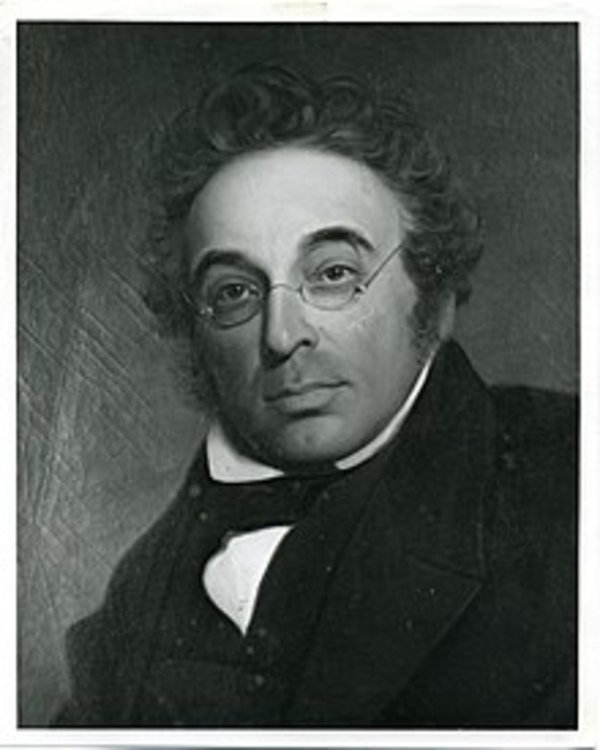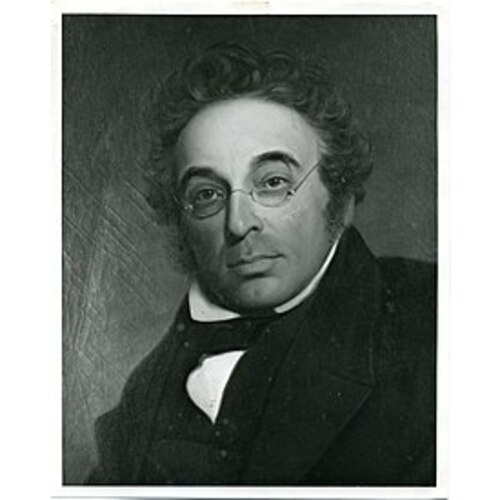
Source: Courtesy of Wikimedia Commons
BENJAMIN, GEORGE, journalist, politician, and Orangeman; b. 15 April 1799 in Sussex, England; he was married and had 12 children; d. 7 Sept. 1864 at Belleville, Canada West.
Little is known about George Benjamin’s family background and early life. He immigrated to North America as a young man, resided for a time in North Carolina, and came to Upper Canada about 1830. He at first lived in York (Toronto) where he became acquainted with James Hunter Samson, member of the assembly for Hastings and the leading barrister of Belleville. Induced by Samson, Benjamin purchased a printing press and, establishing himself as a printer in Belleville, began publication in 1834 of the Intelligencer, a newspaper that consistently upheld a conservative point of view.
Benjamin probably joined the Orange Order at this time, in company with Conservative leaders of the Newcastle District (including George Strange Boulton, John Brown, mha for Durham, and Colonel John Covert*) who were attempting to turn the Orange lodges into conventional Conservative clubs. Benjamin appears to have been acceptable to Belleville Conservatives and to governing circles in Toronto for he was soon appointed a captain in the Belleville militia. In spite of his status he served in the ranks of a volunteer company which repelled Canadian rebels and American infiltrators in the Gananoque area in 1838. This action undoubtedly enhanced his prestige in the politics of Hastings County. He promoted the building of a plank road between Belleville and Camden, and finally, with the support of an American entrepreneur, made the project a financial success. Benjamin also initiated the macadamizing of roads in his district.
His early appointments included that of notary public in 1836 and town clerk of Belleville from 1836 to 1847; he was appointed registrar of Hastings County, town clerk of Thurlow, and clerk of the Belleville board of police in 1847. When Hastings County was separated from the Midland District in 1849, Benjamin was one of the commissioners appointed to settle the financial aspects of the separation. For a time he served as councillor and reeve of Hungerford Township and from 1847 until 1862 was warden of Hastings.
Benjamin acquired these lucrative and relatively prestigious offices through his political influence and that of his friends, Ogle Robert Gowan*, Edmund Murney, and Samson. The appointments helped Benjamin consolidate his power in the county, but his connections with the Orange lodges brought him wider prominence. In 1846 he became grand master of the Orange Order in British North America, supplanting its founder, Gowan, who was preoccupied with his legislative career. At that time there were nearly 50,000 Orangemen in Upper Canada who, since 1836, had become an important element in the electoral strength of the Tory party. However, as Orange leader, Gowan on several occasions had denounced the Family Compact, and he had advocated responsible government in an 1839 pamphlet. Although an associate of John A. Macdonald* in the 1840s, Gowan was regarded as “unrespectable” and an outsider by ultra Tory and Compact leaders such as Sir Allan MacNab. Conservative Orangemen thus felt the need for a less provocative and more conciliatory grand master and Benjamin appears to have met this need. In 1851 he helped secure the repeal of the legislation against Orange processions, only two years after Orange participation in the attacks on Lord Elgin [Bruce] following the passage of the Rebellion Losses Bill.
Benjamin and Gowan had worked together in organizing the British American League in 1849 to combat annexationist and republican sentiments. But in 1852, when Gowan had moved from Brockville to Toronto, he decided to challenge Benjamin’s leadership of the Orange movement. By this time Gowan was identified with John A. Macdonald’s policy of maintaining an alliance between the Conservatives of Canada West and G.-É. Cartier*’s Bleu party in Canada East. It is not clear whether Gowan’s or Benjamin’s supporters were in the majority at the vital grand lodge meeting in Kingston in 1853, but Gowan, the more forceful and less scrupulous of the two, succeeded in reasserting his leadership. Gowan’s attack on Benjamin’s leadership was more than a personality clash: Benjamin’s followers withdrew to form a schismatic grand lodge which rejected the Conservative alliance with the Bleus. Thus, although a moderate by temperament and in his previous associations, Benjamin found himself at the head of the anti-clerical wing of Orangeism which supported George Brown*’s voluntarist policies. The majority of Orangemen probably shared Benjamin’s suspicions of the Bleu alliance. Benjamin, however, had not been active as grand master (an average of only eight new lodges a year had been founded by him) and did not have a strong personal following.
After the schism Gowan undertook a tour of the eastern counties of the province, founded 124 lodges in 1854, and reported in June 1855 that of 589 lodges, only 150 paid dues to the schismatic grand lodge. He noted with satisfaction that the pro-Benjamin Bytown Orange Lily and Protestant Vindicator and the Toronto British Canadian had both ceased publication. A hard working and imaginative politician in local affairs, Benjamin had little sympathy with Gowan’s conception of higher political combinations, and because his personal influence hardly extended beyond his own district, he could not hope to compete effectively with Gowan who was well known in the province. Benjamin nevertheless kept the schismatic lodge in being and forced Gowan to accept an agreement whereby both grand masters resigned in 1856, permitting the reunion of the movement under the neutral George Lyttleton Allen. Once the schism was healed, it was John Hillyard Cameron*, rather than Benjamin, who led Orange opposition to the Bleu alliance.
Benjamin was elected by a substantial majority as member of the legislature for North Hastings in 1856, after the resignation of Edmund Murney. Benjamin had been defeated in the same riding in 1848, and his election in 1856 marked the beginning of a modest but useful parliamentary career that lasted until 1863. He favoured “rep. by pop.,” but voted for separate schools and generally supported Macdonald’s alliance with the Bleus. Benjamin was, in fact, a moderate Conservative whose interest in Orangeism was political. He became leader of the “extreme Protestant” wing only after Gowan decided to drive him from office. Benjamin had to make concessions to the anti-clerical sentiments of the electorate, but the essential moderation of his policy is indicated by his vote for the incorporation of the Catholic Ladies of Loretto, for which he was rebuked by the Globe, and which undoubtedly lost votes for him in the closely contested election of 1857. But Benjamin was really more concerned with the administrative aspects of parliamentary life. He was credited with saving the government $500,000 as a member of the parliamentary printing committee, for which he received a grant of $2,000.
In 1862 he again sought election as councillor for Hungerford and warden for North Hastings, but his election was voided on technical grounds. He did not contest his seat in the provincial election of 1863, and died after a long illness the following year.
George Benjamin was the author of Short lessons for members of parliament . . . (Quebec, 1862), a guide to parliamentary rules and practice. PAC, MG 24, C34. Elgin-Grey papers (Doughty), I, 408. Loyal Orange Assoc. of British North America, Grand Lodge, Annual report (Toronto), 1853, 1856, 1865. Loyal Orange Assoc. of British North America, Grand Lodge, Annual report (Bytown [Ottawa]), 1854. Brockville Recorder, 9, 23 Oct. 1856. Daily News (Kingston, [Ont.]), 9 Sept. 1864. Globe, 9 Sept. 1864. Intelligencer (Belleville, [Ont.]), Jan.-March 1862. Montreal Gazette, 8 July 1854. Orange Lily and Protestant Vindicator (Bytown [Ottawa]), 4 Feb., 4 March 1854. Toronto Patriot, 14 Sept. 1864. Weekly Post (Montreal), 14 Aug. 1846. Armstrong, Handbook of Upper Canadian chronology, 130, 145, 198. CPC, 1862, 1863. Morgan, Bibliotheca Canadensis, 27. Political appointments, 1841–65 (J.-O. Coté), 98, 101, 112. Wallace, Macmillan dictionary, 49. Careless, Brown, II, 22. Creighton, Macdonald, young politician, 195, 308, 328.
Cite This Article
Hereward Senior, “BENJAMIN, GEORGE,” in Dictionary of Canadian Biography, vol. 9, University of Toronto/Université Laval, 2003–, accessed February 19, 2026, https://www.biographi.ca/en/bio/benjamin_george_9E.html.
The citation above shows the format for footnotes and endnotes according to the Chicago manual of style (16th edition). Information to be used in other citation formats:
| Permalink: | https://www.biographi.ca/en/bio/benjamin_george_9E.html |
| Author of Article: | Hereward Senior |
| Title of Article: | BENJAMIN, GEORGE |
| Publication Name: | Dictionary of Canadian Biography, vol. 9 |
| Publisher: | University of Toronto/Université Laval |
| Year of publication: | 1976 |
| Year of revision: | 1976 |
| Access Date: | February 19, 2026 |



